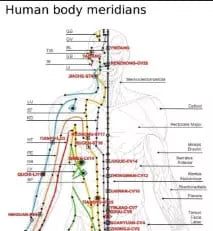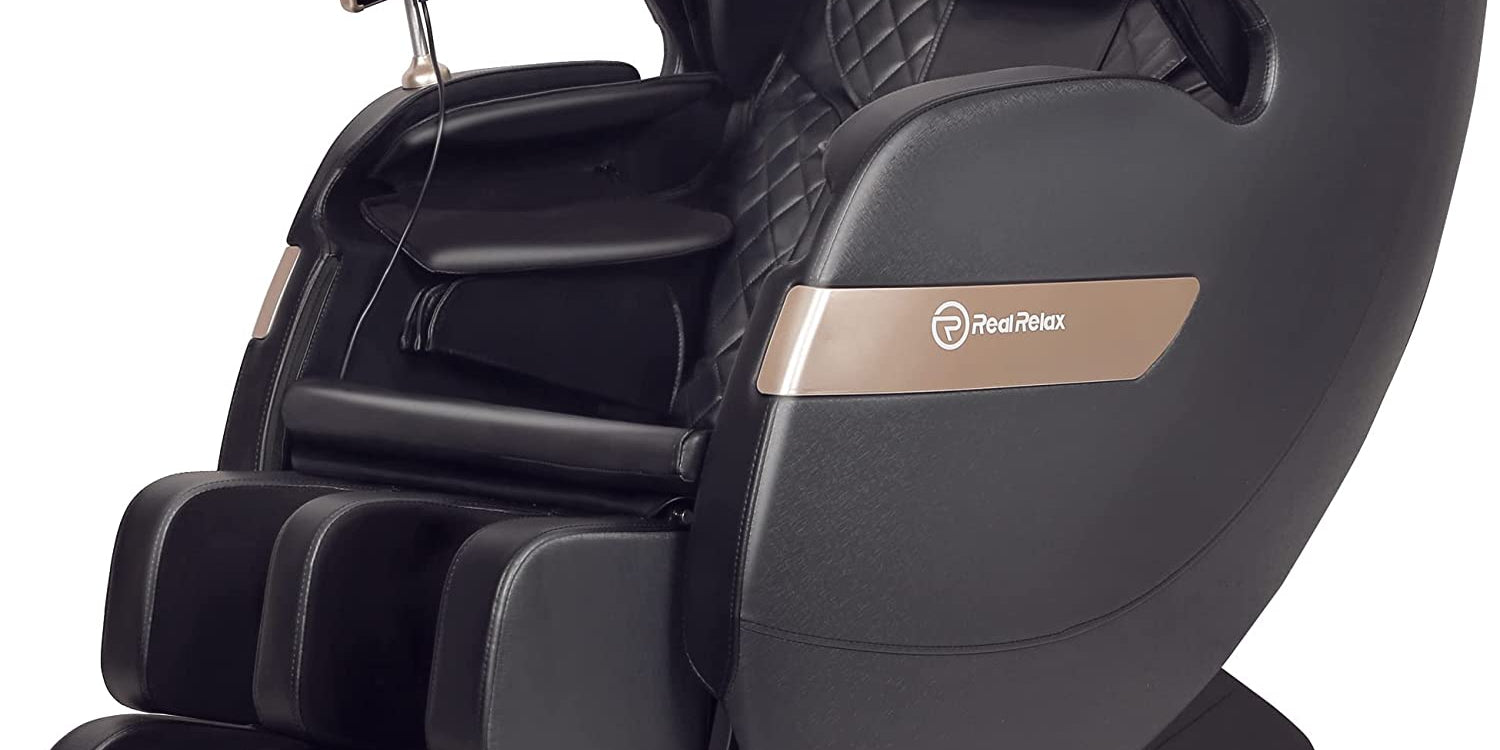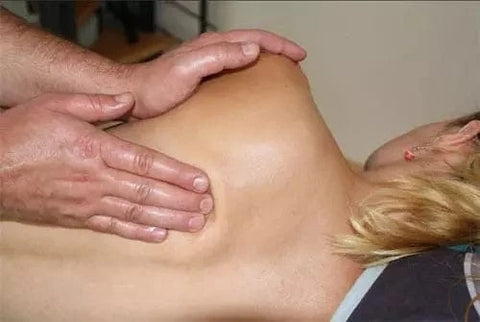WE’LL START WITH HOW THIS MASSAGE STYLE IS DELIVERED IN THE TYPICAL CHAIR.
Acupressure is a massage chair is performed in one of two ways. The first is via airbags located throughout the massage chair (backrest, hips, shoulder, arms, legs, and feet). Think of the last time you had your blood pressure tested, and you had that rubber cuff wrapped around your arm; in a massage chair, there are bladders similar to this cuff that apply pressure via air compressors.
The second way acupressure is delivered is with steady pressure applied via the massage hands (or rollers, typically comprised of soft rubber). In this case, it mimics human fingers that press directly into the muscle tissue.
From a purely physiological standpoint, the idea behind acupressure in a massage chair is that pressing into areas of the body, impacts the flow of fluids and nerve impulses, which can provide physical benefits. However there are more esoteric beliefs that have their roots in traditional Chinese medicine going back thousands of years, that posit that acupressure can also promote relaxation, and even more ambitiously, treat some forms of the disease. These beliefs are based on the idea that there is a constant flow of energy throughout the body that interconnects our organs, and their proper function.
You may have heard about this type of energy if you’ve ever heard the term “Yin-Yang” or seen this symbol: If you’ve heard of the concept of “Yin and Yang”, you’ve stumbled across the basic principle of acupressure, as well as acupuncture. In Chinese philosophy, yin yang translates to “dark bright” or “negative-positive” – the idea that seemingly opposite forces co-exist to provide a balance. However, that balance is precarious and can get out of whack under certain conditions and thereby cause negative consequences in people, both physically and emotionally. While this might seem rather “new age” when you think about it in the context of something like a pulled hamstring or strained back muscle it makes perfect sense.
If you’ve heard of the concept of “Yin and Yang”, you’ve stumbled across the basic principle of acupressure, as well as acupuncture. In Chinese philosophy, yin yang translates to “dark bright” or “negative-positive” – the idea that seemingly opposite forces co-exist to provide a balance. However, that balance is precarious and can get out of whack under certain conditions and thereby cause negative consequences in people, both physically and emotionally. While this might seem rather “new age” when you think about it in the context of something like a pulled hamstring or strained back muscle it makes perfect sense.
MUSCLE IMBALANCE
Let’s say you pull a hamstring while running or working out. Your body reacts to this damaged tissue by instinctively trying to protect that tissue from further injury. By doing so, complimentary or opposing muscle groups attempt to protect this damaged area by “taking up the slack” of the hamstring, that by being strained is not functioning at full strength.
Opposite muscle groups – say for example the quads of the thighs may need to work a bit harder to accommodate the weakened hamstring, and by doing so create an inherent imbalance. While in the short term this is the body’s way of naturally protecting the injury so healing can occur, if this imbalance persists too long the asynchronous tension can over time lead to further injury. The same might apply to the back muscles – over time an imbalance can cause too much opposing strain on the spine leading to back pain.
MERIDIAN IMBALANCE
At a higher level, this is where ancient Chinese practices come in. Meridians are the term applied to “undetectable to the naked eye” energy flows throughout the human body. Without going too deeply into the concepts of meridians, the basic idea here is that this invisible energy flow influences every organ and physiological system in the body. Think of this flow as energy moving just like blood does – in the case of energy it travels through these distinct meridians; in the case of blood, it moves through arteries. You may have hears of the term chi, which is a name for this energy.
 There are 12 primary meridians that map to distinct organs – so for example the lungs, spleen, stomach, intestines, bladder, kidneys, liver, and so forth. If the energy flowing through a meridian is imbalanced in any way, the system it fuels is jeopardized. This can lead to general feelings of malaise or sickness, or worse, if untreated, disease.
There are 12 primary meridians that map to distinct organs – so for example the lungs, spleen, stomach, intestines, bladder, kidneys, liver, and so forth. If the energy flowing through a meridian is imbalanced in any way, the system it fuels is jeopardized. This can lead to general feelings of malaise or sickness, or worse, if untreated, disease.
ACUPRESSURE & ACUPUNCTURE
The concept of treating the body with acupressure in a massage chair is related to the same basic principles of acupuncture. In fact, acupressure is often thought of as acupuncture without those (to some) scary-looking needles. Instead of using needles to impact the flow of energy, acupressure is applied by the airbags in the back, arms, shoulders, legs, and feet to positively impact the flow of the body’s own energy. The nice thing about acupressure in a massage chair is that it delivers the added benefits of more diffuse muscle manipulation associated with traditional massage, which further helps alleviate soreness and helps the muscles relax. Acupuncture on the other hand is specifically designed to help restore the flow of energy via meridians in the body, to improve overall health and well-being.
Whether using airbags and the massage hands in a massage chair or visiting an acupuncture specialist for needle-based treatments, both hold the potential to address and improve imbalances in the body – whether musculature imbalances or energy flow imbalances. The intent of both is to restore optimal balance which in turn can improve the health of the body overall.
MASSAGE CHAIR ACUPRESSURE
As mentioned above, acupressure in a massage chair is delivered via the airbags (also referred to as pressure bladders) and the massage rollers that traverse the neck, back, and glutes, or can be stationary with the “spot” massage function (also referred to as the massage hands). Shiatsu, a popular massage style delivered by most premium massage chairs on the market today, is a Japanese form of acupressure. The word “Shiatsu” is a combination of two Japanese words “shi,” which means finger, and “atsu,” which means pressure.
This distinct localized pressure applied by the airbags and massage hands is targeted to special acupoints that are both muscular and align to meridian flow points. Just as in human-administered massage, the massage chair releases tension by pressing acupoints, while restoring healing balance to the flow of energy throughout the body and to internal organs. Some medical studies have suggested that acupressure may be effective at helping manage nausea and vomiting, for helping lower back pain, tension headaches, stomach ache, among other things. Acupressure was also found in a Cochrane Review trial to help control the pain of childbirth!
Many massage chair models have arm airbags, shoulder airbags, and airbags that compress the lower legs. People often wonder about the benefits of having their body parts being pressed; however, these mechanisms were all designed to provide the benefit of acupressure, which delivers a host of benefits for overall health and well-being.
So if you are interested in the concept of acupressure in a massage chair, you can take advantage of this ancient healing art with the press of a button. A massage chair can provide full-body styles such as Swedish and tapping, plus Shiatsu for pressure point treatments. You just might find the healing benefits of acupressure can have a positive impact on your health – without the needles!
All of our massage chairs provide some form of acupressure but the one that does it best is the Positive Posture Sport with the most air compression cells of any massage chair



































